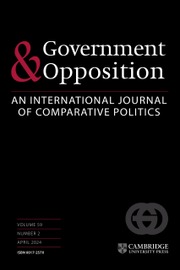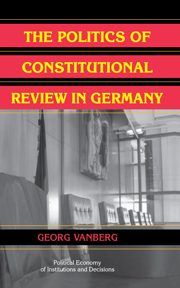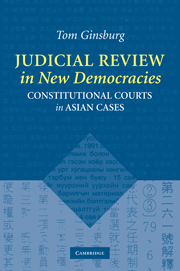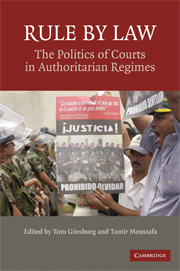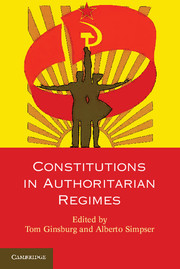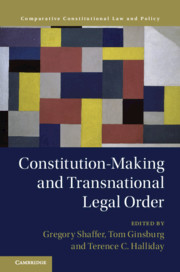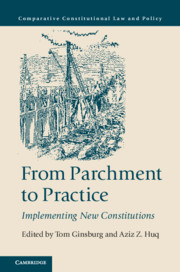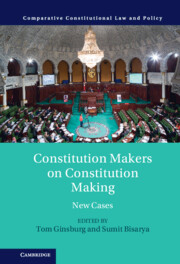Constitutions in Times of Financial Crisis
$35.99 (F)
Part of Comparative Constitutional Law and Policy
- Editors:
- Tom Ginsburg, University of Chicago
- Mark D. Rosen, Illinois Institute of Technology
- Georg Vanberg, Duke University, North Carolina
- Date Published: June 2022
- availability: Available
- format: Paperback
- isbn: 9781108729208
$
35.99
(F)
Paperback
Other available formats:
Hardback, eBook
Looking for an examination copy?
This title is not currently available for examination. However, if you are interested in the title for your course we can consider offering an examination copy. To register your interest please contact [email protected] providing details of the course you are teaching.
-
Many constitutions include provisions intended to limit the discretion of governments in economic policy. In times of financial crises, such provisions often come under pressure as a result of calls for exceptional responses to crisis situations. This volume assesses the ability of constitutional orders all over the world to cope with financial crises, and the demands for emergency powers that typically accompany them. Bringing together a variety of perspectives from legal scholars, economists, and political scientists, this volume traces the long-run implications of financial crises for constitutional order. In exploring the theoretical and practical problems raised by the constitutionalization of economic policy during times of severe crisis, this volume showcases an array of constitutional design options and the ways they channel governmental responses to emergency.
Read more- Offers the first volume on financial emergencies and constitutions
- Takes a multi-jurisdictional and historical approach
- Analyzes reciprocal causality
Reviews & endorsements
'… this work is an excellent academic account for researchers … this volume is well described as a showcase for an array of constitutional design options and the ways they channel governmental responses to emergency.' Elizabeth Robson Taylor, Phillip Taylor, The Barrister
Customer reviews
17th Oct 2024 by UName-456522
THE FINANCIAL CRISIS REVISITED AFTER A PERIOD OF FISCAL STABILITY An appreciation by Elizabeth Robson Taylor of Richmond Green Chambers and Phillip Taylor MBE, Head of Chambers, Reviews Editor, “The Barrister”, and Mediator One of the great benefits of the titles published by Cambridge University Press (CUP) is the broad range and diversity of the subject-matter under review. This excellent new publication took our immediate attention. The title is called “Constitutions in Times of Financial Crisis” and forms part of the CUP series on comparative constitutional law and policy. It has been edited by Tom Ginsburg, Mark D Rosen and George Vanberg and includes eighteen international contributions from experienced academics from law and politics. What the editors say is that many constitutions include provisions which are intended to limit the discretion of governments concerning economic policy. And in times of financial crises in 2007 and 2008, these provisions are often placed under pressure as a result of calls for exceptional responses to crisis situations. The foreword by Goncalo Saraiva Matias goes on to talk of the challenges at that time were faced not only by the countries that were directly affected by what happened but were also directly affected by the austerity measures which were needed, particularly in Europe. Matias also writes that Europe became what was effectively “a constitutional laboratory” because of the effect of the crisis on a variety of economies, specifically in the sovereign debt markets, on public finances, “and ultimately on the ability of governments to sustain the welfare state”. Taken such factors into account, we feel that this work is an excellent academic account for researchers. The three editors describe the book as an assessment of the ability of constitutional orders all over the world to cope with financial crises, and the demands for emergency powers that typically accompany them. Usefully, the editors have brought together a variety of perspectives from legal scholars, economists, and political scientists to offer a book which reviews “the long-run implications of financial crises for constitutional order.” It does so brilliantly in our opinion and this book deserves a second read in case we must prepare for further emergencies. In exploring the theoretical and practical problems raised by “the constitutionalization of economic policy during times of severe crisis”, this volume is well described as a showcase for an array of constitutional design options and the ways they channel governmental responses to emergency. Thank you to all concerned for such interesting observations. The hardback book was first published on 8th June 2019. It is also available as an ebook.
Review was not posted due to profanity
×Product details
- Date Published: June 2022
- format: Paperback
- isbn: 9781108729208
- length: 342 pages
- dimensions: 229 x 152 x 18 mm
- weight: 0.462kg
- availability: Available
Table of Contents
1. Introduction Tom Ginsburg, Mark Rosen and Georg Vanberg
Part I. The Role of Constitutions in Dealing with Crises:
2. Financial emergencies John Ferejohn
3. Rule-of-law objections to the lender of last resort Eric A. Posner
4. Balanced budget provisions in constitutions Tom Ginsburg
5. Legislatures and constitutions in times of severe financial crisis Mark D. Rosen
Part II. Courts and Crises:
6. The place of economic crisis in American constitutional law: the Great Depression as a case study Barry Cushman
7. Financial crises and constitutional compromise Georg Vanberg and Mitu Gulati
8. Commitment for cowards: why the judicialization of austerity is bad policy and even worse politics Daniel Kelemen
9. Protecting fundamental rights during financial crisis: supranational adjudication in the Council of Europe Eva Brems
Part III. Supranational Governance and Crisis:
10. Constitutionalism as limitation and license: crisis governance in the European Union Turkuler Isiksel
11. The institutional origin of Europe's constitutional crises: Grexit, Brexit and the EU form of government Federico Fabbrini
Part IV. Implementing Austerity:
12. The constitutional performance of austerity in Portugal Teresa Violante and Patrícia André
13. Constitutional resilience and constitutional failure in the face of crisis: the Greek case Xenophon Contiades and Alkmene Fotiadou
Part V. The Effect of Crises on Constitutions:
14. Economic crises, political fragmentation, and constitutional choice: the agenda-setting power of presidents in Latin America Gabriel L. Negretto
15. Constitutions, crisis, and regime change: perspectives on East and Southeast Asia Björn Dressel.
Sorry, this resource is locked
Please register or sign in to request access. If you are having problems accessing these resources please email [email protected]
Register Sign in» Proceed
You are now leaving the Cambridge University Press website. Your eBook purchase and download will be completed by our partner www.ebooks.com. Please see the permission section of the www.ebooks.com catalogue page for details of the print & copy limits on our eBooks.
Continue ×Are you sure you want to delete your account?
This cannot be undone.
Thank you for your feedback which will help us improve our service.
If you requested a response, we will make sure to get back to you shortly.
×
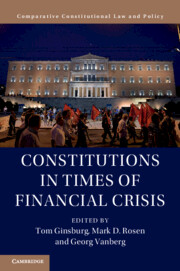
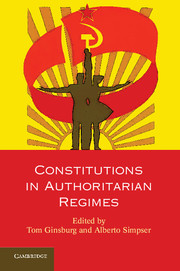
.jpg)

